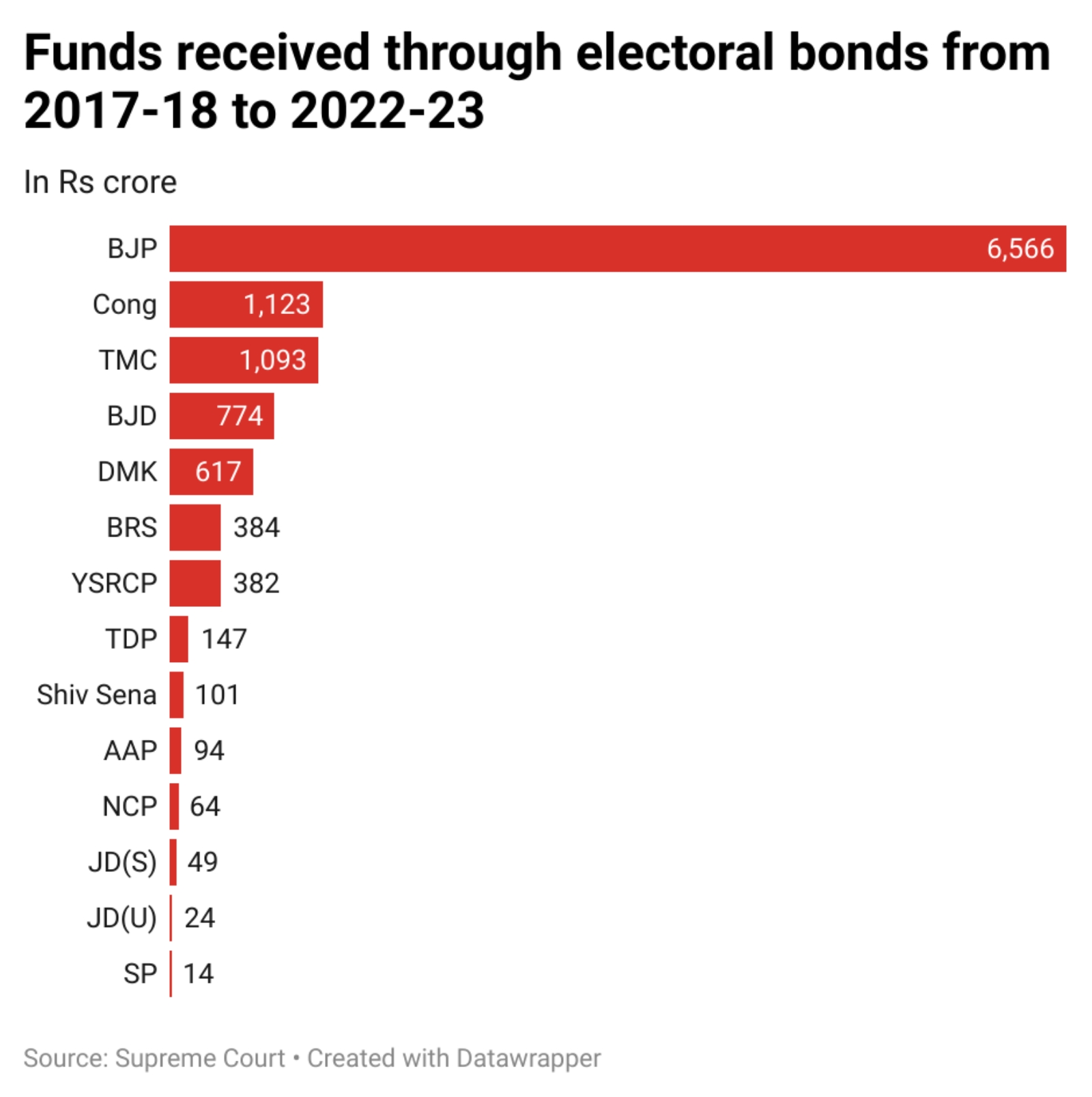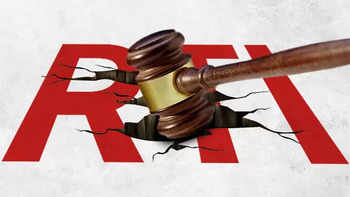Is SBI’s Demand For Extra Time To Disclose Details Of Electoral Bonds An Attempt To Hide The Doings And Doers Of ‘Political Chanda’?

In a landmark judgment, the apex court, the Supreme Court of India, struck down the electoral bonds (EBs) scheme as “unconstitutional and manifestly arbitrary, ” which gives blanket anonymity to political donors and critical legal amendments allowing wealthy corporations to make unlimited political donations. The SBI, the only bank authorised to issue these bonds, was immediately asked to stop this and directed to reveal the details of the political parties involved in the transaction of each electoral bond.
However, the country’s apex bank, SBI, has requested that the Supreme Court allow them to disclose details of electoral bonds by June 30 as SBI stated it needs to break down the details of 22,217 EBs, which would entail decoding, assembling, and comparing 44,434 information sets because information about bond buyers and beneficiaries is stored in two different information silos.
The Association for Democratic Reforms (ADR) then filed a contempt complaint against SBI, alleging purposeful disobedience to the Supreme Court’s decision. ADR described the SBI application as “mala fide” and a “wilful and deliberate violation” of the Supreme Court’s order.
The details of the plea filed by ADR.
According to ADR, SBI applied on March 4, 2024, at the last minute to avoid disclosing donor details and donation amounts before the upcoming Lok Sabha elections. The application also fails to reveal progress and steps taken to comply with the judgement.
ADR stated that the affidavit supporting the application was not sworn by the Chairman or Managing Director of State Bank of India but by a “low-level functionary of SBI, namely one Mr Narendra Pratap Singh who describes himself as AGM (Assistant General Manager) working at Corporate Centre, SBI, Mumbai.” The petition stated, “It is odd that his name does not even exist on the list of 59 high-ranking executives working at Corporate Centre Mumbai, according to SBI’s website.”
According to the plea, “SBI holds a record of the unique number assigned to each Electoral Bond and the purchaser’s KYC credentials. The KYC requirement is mentioned in Section 4 of the EB scheme itself; therefore, the SBI is well aware of the identity of each Electoral Bond purchaser.” “It is unfathomable that SBI does not have the recorded data readily available in its database.”
According to ADR, the Centre stated in its affidavit dated March 15, 2019, that “the plan envisions developing a transparent system of obtaining bonds with validated KYC and an audit trail.” UOI admits that the SBI records the donor’s KYC credentials, PAN, identity details, and complete address.
According to experts, “because each electoral bond has a unique number, a simple query on the database can provide a report in a certain format that does not require any manual verification.” That sealed envelopes are simply physical instruments, similar to a cheque; the actual transaction of the cheque being deposited is stored in a database and can be quickly recovered by performing a software query.”
In the plea, ADR also pointed out that SBI’s website shows it has 2,60,000 employees, 22,500 global branches administered by a headquarters, 17 local head offices, 101 zonal offices, and 208 foreign offices in 36 countries, and that “it is difficult to believe that SBI is not able to gather the information that SBI has itself recorded.”
According to the petition, an RTI query revealed that SBI “paid Rs 60,43,005 on IT system development” for bond management, the operational cost was Rs 89,72,338, and the net cost for floating of EBs was Rs 1,50,15,338. “This implies that a well-functioning IT infrastructure is already in place for managing the sale and redemption of electoral bonds.”
Pointing out that only 19 out of the 29 SBI authorised branches sold Electoral Bonds and 14 SBI branches encashed them, it stated that “data available as of January 2024 further shows that only 25 Political Parties had opened their accounts and are eligible for encashing Electoral Bonds” and that “therefore, compiling of this information should not be difficult as the system is already in place.”
ADR argued that SBI must provide accurate information regarding electoral bonds within a specific time limit. Failure to do so will prevent voters from making informed decisions during Lok Sabha 2024. This defiant approach of the SBI towards citizens’ ‘Right to Know’ about vast sums of funds received by parties through Electoral bonds and corporations in an unclear and unaccountable manner is reprehensible. It betrays its clear motive to silence citizen’s voice and right to audit actions of the political class, and thus it should be held as a severe breach of contempt by this Hon’ble court.”
Why the doubt about the political chanda? Is SBI deliberately up in the attempt of ‘The Pradhan Mantri Chanda Chipao Yojana’, as termed by Congress leader Jairam Ramesh?
While SBI works slowly in providing the names of persons who played secret Santas to political parties, citing the difficult nature of the task, the bank has previously demonstrated remarkable quickness in responding to similar government demands. In a trove of documents shared with ‘The Reporters’ Collective‘ by transparency activist and Navy Veteran Commodore Lokesh Batra and used as the foundation for a series of investigative exposes on electoral bonds in 2019 and 2020, there are many pieces of pivotal evidence that show SBI raced to provide data on electoral bonds to the government in the shortest possible time, sometimes as few as 48 hours.
Then why is the bank asking for extra time for this? Is it just to hide Secret Santa’s name before the upcoming elections?
The central ruling party’s funding has increased numerous times since the installation of the Electoral Bonds scheme. How?
In an interview with senior journalist Nidhi Razdan last year, Senior Advocate and Rajya Sabha MP Kapil Sibal stated that the electoral bonds plan is perhaps the most giant scam in the country’s history, with the sole objective of enriching the ruling political party. He described the program as a perversion of democracy and the election system.
Sibal claimed that the programme was implemented to fund the ruling party, making it the richest in the country. He claimed the term ‘electoral bonds’ was a misnomer, as it had nothing to do with elections. He added that the scheme intends to give the funds to the party.

According to the analysis of the electoral bonds plan, the ruling BJP received nearly 55% of the money until March 2023, with its closest enemy, Congress, receiving only 9.3%. Bond sales peaked during the 2019 Lok Sabha elections, with bonds worth ₹2,256.37 crore sold between April 1 and 20.
Until March 2023, the BJP received ₹6,566.11 crores through EBs, while the Congress received ₹1,123.29 crore. In the 2019-2020 Lok Sabha elections, the ruling party received a maximum of ₹2,555 crore, while the Congress received ₹317.86 crore, according to annual audit records made public by the Election Commission.
It can now be understood what Mr Sibal wanted to mean? The ruling party intentionally brought this scheme to receive political funds.
On January 7, 2017, two months after announcing a ban on the circulation of INR 500 and INR 1,000 currency notes, PM Modi spoke at the BJP’s national executive meeting in Delhi, saying there was a need to make political funding more transparent and that his party supported electoral reforms.
This government has made three major changes to the operations of political funding in India:
- Political parties can now accept foreign money.
- Any company can donate any amount of money to any political party.
- Any individual, group of people, or company can donate money anonymously to any party via electoral bonds.
It has been argued that rather than boosting transparency, these three rules have increased the process’s opaqueness.
This is not the first time. Earlier also, ministers of central ruling party have lied about the materials of Electoral bonds.
When Finance Minister Arun Jaitley announced electoral bonds in 2017, a secretive way for anonymous persons (corporates, individuals, and trusts) to pour money to political parties, he justified his decision by claiming, “Donors have also showed reluctance in donating by cheque or other transparent ways as it would disclose their identity and entail adverse consequences.”
Since then, members of the ruling BJP have regularly addressed the issue of the unknown contributors who requested anonymity. Union Minister Piyush Goyal made the same remark in 2019 during a news briefing to discuss HuffPost India’s probe into electoral bonds.
Three years after Jaitley’s statement, and after unidentified donors gave political parties bonds worth Rs 6,108.47 crore, the finance ministry stated in 2019 that no donor ever told the government to develop an opaque system of supporting political parties. This came as a response to the Right to Information request filed by Venkatesh Nayak. This statement itself from ‘Modi ka Pariwar‘ contradicts Prime Minister Narendra Modi’s oft-repeated commitment to upgrade transparency and governance. As an outcome, there is no perceptible change in the concept of secrecy that breeds corruption in the ruling BJP.


This information, or per se revelation, was done in response to the historic RTI Act, which the present ruling party tried to dilute in a number of ways.
On June 3, 2013, the CIC (Central Information Commission) designated six national political parties—the INC, BJP, CPI(M), CPI, NCP, and BSP—as “public authorities” under Section 2(h) of the RTI Act based on a complaint made by ADR and Subhash Agrawal.
For Batra, the transparency activist, the bombshell disclosures he found demonstrate the potential of the RTI Act. An act that the Modi government is attempting to defang. “It was mind-boggling that while the BJP claimed it was introducing electoral bonds to increase transparency in election funding, it, like other political parties, refused to comply with the CIC Order of 2013, Batra added. According to Batra, the 2013 order would have required political parties to comply with the RTI Act and ensured transparency in political funding. As a result, it was critical for him to understand all the details of the FM’s plan for transparency in political finance, Batra added.
As it turned out, the Reserve Bank of India, the Election Commission, and a number of opposition parties had fiercely opposed the bonds, as Batra’s RTI requests had disclosed. The documents exposed the Modi government’s ministers’ lies to Parliament regarding the bonds, the Prime Minister’s Office’s breach of the Finance Ministry’s regulations to create an election bond special window, and the Finance Ministry’s own infraction of rules when it permitted bonds that had expired to be cashed.

Yet, since the RTI Amendment Bill was introduced in 2019, the Act that made these disclosures possible has come under threat. The administration of Prime Minister Modi has diluted the RTI Act’s provisions, making it potentially harder to get responses to inquiries like the ones above. The RTI modification implies that, depending on its political needs, the government may intimidate or entice the chief information commissioner and other information commissioners.
After all this situations, it becomes clear why ADR blames SBI of keeping the citizens under curtain to hide information from the public regarding the things of electoral bonds.
From lying about the secrecy of donors of electoral bonds, to getting maximum donations after the inceptions of electoral bonds, to diluting the provisions of RTI act that empowers the citizens to know about their nation and many more, the current ruling government has tried every possible way to breed corruption, contradicting its own notion of curtailing corruption, as applauded during the massive destruction drive of demonetization.




